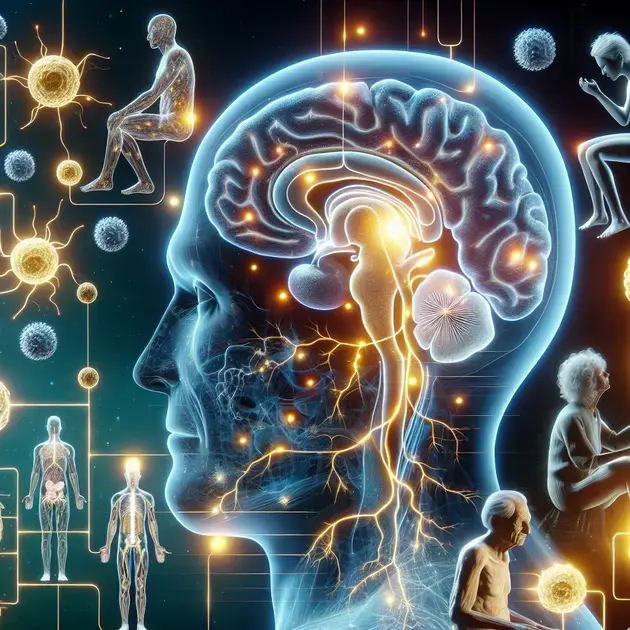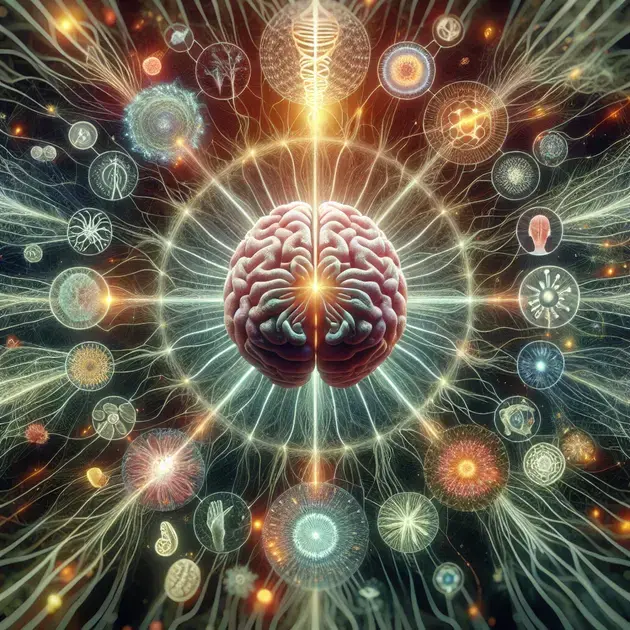The Pineal Gland, often referred to as “The Master Gland of the Brain,” plays a crucial role in regulating various functions of the human body. This small, pea-shaped gland located in the center of the brain produces the hormone melatonin, which helps control sleep patterns and influences the body’s internal clock.
Furthermore, recent studies have shown that the Pineal Gland is not only responsible for regulating sleep but also plays a significant role in other bodily functions, such as influencing mood, sexual development, and even aging. Its intricate connection to the body’s overall well-being highlights the importance of understanding and caring for this master gland in the brain.

The Pineal Gland and its Role in Regulating Sleep Patterns
The pineal gland, located in the brain, plays a crucial role in regulating our sleep patterns through the secretion of the hormone melatonin. Melatonin is responsible for signaling to the body when it’s time to sleep and wake up, thus maintaining our circadian rhythm. To enhance the function of the pineal gland and improve sleep quality, individuals can try using meditation apps like Headspace or Calm. These apps offer guided meditation sessions specifically designed to reduce stress and promote relaxation, ultimately aiding in melatonin production.
Additionally, exposing oneself to natural light during the day and minimizing exposure to artificial light at night can help regulate the pineal gland’s melatonin production. Apps like Flux for desktop and Twilight for mobile devices can be used to reduce blue light exposure in the evenings, supporting the natural sleep-wake cycle controlled by the pineal gland.
Creating a consistent sleep schedule and practicing good sleep hygiene are also essential for optimizing the pineal gland’s function. Apps like Sleep Cycle can assist in tracking sleep patterns and providing insights for better sleep habits, ultimately contributing to a healthier relationship between the pineal gland and our sleep patterns.
In conclusion, understanding the role of the pineal gland in regulating sleep patterns highlights the importance of maintaining a healthy lifestyle and utilizing helpful tools and apps to support optimal sleep quality.
Exploring the Pineal Gland’s Influence on Mood and Sexual Development
The pineal gland not only regulates biological rhythms but also influences mood and sexual development through the secretion of various hormones, including serotonin and dopamine. These neurotransmitters play a significant role in mood regulation, emotions, and libido. To explore the impact of the pineal gland on mood and sexual development, individuals can consider using mood tracking apps like Moodnotes or Daylio.
By monitoring mood changes and recognizing patterns, individuals can gain insights into how their pineal gland function may be affecting their emotional well-being and sexual drive. Additionally, engaging in activities that promote serotonin production, such as exercise and exposure to natural light, can support the pineal gland in maintaining a healthy balance of mood-regulating hormones.
Furthermore, maintaining a nutritious diet rich in essential nutrients like vitamin D and omega-3 fatty acids can positively influence the pineal gland’s hormone production, contributing to overall mood stability and sexual health. Apps like MyFitnessPal can help individuals track their nutrient intake and ensure they are meeting their dietary requirements for optimal pineal gland function.
Overall, exploring the pineal gland’s influence on mood and sexual development emphasizes the interconnectedness of body systems and the importance of supporting hormonal balance for overall well-being.
Understanding the Pineal Gland’s Impact on Aging and Overall Well-Being
The pineal gland’s role in regulating the body’s biological clock extends to its impact on aging and overall well-being. As we age, the pineal gland tends to calcify, affecting its ability to produce melatonin efficiently. To understand and address the pineal gland’s impact on aging, individuals can use biofeedback apps like Elite HRV to monitor heart rate variability, a key indicator of stress levels and overall health.
By utilizing biofeedback techniques through apps like Elite HRV, individuals can manage stress levels, support pineal gland function, and potentially slow down the aging process. Engaging in mindfulness practices and deep breathing exercises can also stimulate the pineal gland and enhance melatonin production, promoting better sleep and overall well-being.
Incorporating adaptogenic herbs like ashwagandha or reishi mushrooms into one’s daily routine can further support the pineal gland’s health and resilience against aging. Tracking lifestyle habits and health metrics through apps like Fitbit or Apple Health can provide valuable insights into how various factors, such as exercise, nutrition, and sleep, impact the pineal gland’s function and overall well-being.
By understanding the pineal gland’s impact on aging and taking proactive steps to support its function, individuals can enhance their quality of life, promote healthy aging, and nurture overall well-being for years to come.

**The Function of the Pineal Gland in Hormone Regulation**
The Pineal Gland Anatomy and Function
The pineal gland is a small, pea-shaped gland located in the brain that plays a crucial role in regulating hormone secretion. It is known as the “third eye” due to its connection to light and dark cycles and its influence on the body’s internal clock. The pineal gland produces and releases melatonin, a hormone that helps regulate sleep-wake cycles and is essential for maintaining proper circadian rhythms.
Furthermore, the pineal gland is involved in the regulation of other hormones, such as cortisol, which is important for stress response and metabolism. By modulating the secretion of these hormones, the pineal gland helps coordinate various physiological functions and responses in the body.
Research has also shown that the pineal gland may have additional functions beyond hormone regulation, including antioxidant activity and neuroprotection. Its intricate interactions with the endocrine system highlight its significance in maintaining overall health and well-being.
The Impact of Pineal Gland Dysfunction
When the pineal gland fails to function properly, it can lead to disruptions in hormone regulation and circadian rhythms. This can result in sleep disorders, mood disturbances, and impaired cognitive function. Additionally, dysregulation of melatonin production has been linked to various health conditions, such as insomnia, depression, and even certain types of cancer.
Individuals with pineal gland dysfunction may experience difficulties in adapting to changes in light exposure and may struggle to maintain a consistent sleep schedule. Addressing issues related to pineal gland dysfunction often involves lifestyle modifications, such as optimizing sleep hygiene and light exposure, as well as medical interventions in some cases.
Overall, the proper functioning of the pineal gland is essential for maintaining hormonal balance, circadian rhythms, and overall health. Understanding its role in hormone regulation is key to addressing potential imbalances and promoting optimal well-being.
Current Research and Future Implications
Ongoing research continues to explore the intricate roles of the pineal gland in hormone regulation and overall health. Studies are investigating potential connections between pineal gland dysfunction and various health conditions, with the aim of developing targeted interventions and treatments.
Advancements in technology and imaging techniques are enhancing our understanding of the pineal gland’s structure and function, providing new insights into its complex interactions with the endocrine system. This knowledge may lead to novel therapeutic approaches for addressing hormone-related disorders and optimizing circadian rhythm synchronization.
As research in this field progresses, the implications for personalized medicine and holistic approaches to health and wellness are promising. By unraveling the mysteries of the pineal gland and its role in hormone regulation, we may unlock innovative strategies for promoting hormonal balance and overall vitality.
Conclusion
The pineal gland, often referred to as the “third eye,” plays a critical role in hormone regulation by producing melatonin and influencing circadian rhythms. This small pea-shaped gland in the brain not only helps regulate sleep-wake cycles but also modulates the secretion of hormones like cortisol, essential for stress response and metabolism. Its intricate interactions with the endocrine system showcase its significance in maintaining overall health and well-being.
When the pineal gland malfunctions, disruptions in hormone regulation and circadian rhythms can occur, leading to issues such as sleep disorders, mood disturbances, and cognitive impairments. Addressing pineal gland dysfunction often involves lifestyle adjustments and, in some cases, medical interventions. Maintaining the proper functioning of the pineal gland is crucial for optimal hormonal balance, circadian rhythms, and overall health.
Ongoing research is delving deeper into the multifaceted roles of the pineal gland, exploring its implications for health conditions and potential treatments. Technological advancements are providing new insights into the gland’s structure and function, offering hope for innovative approaches to addressing hormone-related disorders and optimizing circadian rhythm synchronization. As this research progresses, the outlook for personalized medicine and holistic health approaches appears promising, with the potential to unlock strategies for enhancing hormonal balance and overall vitality.